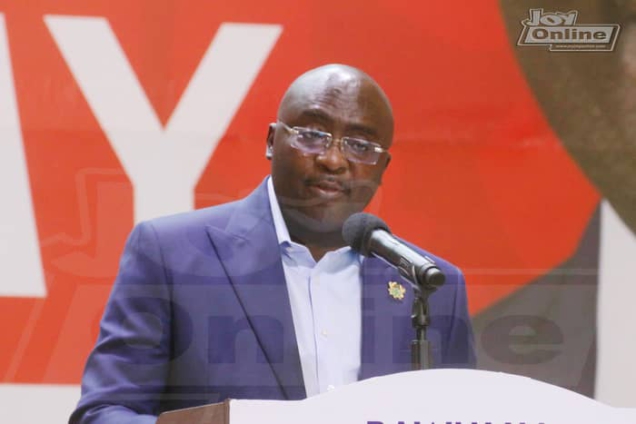As the old adage goes “a drowning man will clutch at a straw.” That is the summary of Dr Bawumia’s two-hour lecture. As I resolved, this time round Dr Bawumia is not going to get the free pass he got in 2016. We will interrogate both the logic and the data.
The only takeaway from Dr Bawumia’s two-hour lecture was his emphasis on the balance of trade (BOT) as the big achievement of the NPP economic management team that he leads. At least on paper.
According to the Vice President, Ghana’s trade balance changed from a deficit of $1.7 billion in 2016 to a surplus of US$1.1 billion in 2017, a larger surplus of $1.8 billion in 2018, and an even larger surplus of $2.2 billion in 2019.
He added that the impact of Covid-19 reduced the trade balance from US$2.04 billion in 2020 to $1.1 billion in 2021. This, the Vice President claimed was better than the deficit recorded under the NDC.
The substance of the claim of superior economic management by the Vice President is unfounded. Commodity trade is not like selling roasted groundnut.
The work that accounted for trade balances in 2017, 2018 and even 2019 probably started in 2013 or earlier. To enter office in January 2017 and claim credit for trade balances of 2017 and 2018 is quite preposterous.
Granted we agree to credit Dr Bawumia and the NPP for the positive trade balance. They would have to deal with the questions of what the NPP did to achieve the positive BOT and how the positive trad balance was achieved.
Remember the NPP as a party that took over 2 years to get a fully functioning government in place so how can they take credit for progress in 2017?
The question of how they achieved positive BOT is even more revealing. For the sake of those not familiar with these jargons, the balance of trade is the difference between the value of exports and imports.
It simply means a country with a deficit has spent more money than it has made in international trade. I will deal with the significance of the trade balance much later but for now, let me show you how cunning Dr Bawumia was with facts in his lecture.
Simply, the value of exports is the price of the commodities multiplied by the quantities a country sells. Dr Bawumia can only claim the credit if he was able to significantly improve the volume and/or value of commodities Ghana exported.
I did not see evidence of this in the data. In fact, cocoa output declined for much of the NPP’s first term in office, as illustrated in figure 1.
There is also no evidence of any significant changes in terms of cocoa processing locally. So how can the positive trade balance between 2017 to 2020, driven largely by cocoa and crude oil revenue be plausibly attributed to NPP Policy?
Dr Bawumia was hiding the devil in the statistics. Much of the balance of trade accrued between 2017 and 2020 was largely attributable to changes (increases) in prices of two of the major export commodities of Ghana, Cocoa and Crude Oil.
In fact, the trend in BOT mimicked the trend in the prices of crude oil and cocoa. This I have also illustrated in the figure. I used his own BOT data so no one will say I cooked the data.
What did Dr Bawumia do to change the prices of Cocoa and Crude Oil? Certainly Nothing. If anything, the BOT highlighted the competence of the NDC in managing the economy better even in the face of declining revenue.
If anything, Dr Bawumia should be worried that he started managing an economy whose revenues were improving because prices of its major export commodities like cocoa and crude oil had recovered and were increasing.
Dr Bawumia should be worried that he and his economic management team led Ghana to accumulate record debt levels, turned a currency that was rebounding into one of the world’s worst-performing currencies and achieved economic ratings in the Cs with a negative outlook.
Dr Bawumia should have known that when the economy of a country grows and strengthens, consumers have more wealth to purchase goods from other countries, and this will invariably increase the trade deficit.
Also increased government spending to improve infrastructure may lead to a BOT deficit especially if heavy investments are made to import machinery and materials for infrastructure.
In the previous administrations, we experienced significant economic growth and massive infrastructural investment thus leading to the deficits in the balance of trade.
It was not as bad as Dr Bawumia would like us to believe.
****
Dr Michael Ayamga is the Head of the Applied Economics Department, UDS, Tamale.
Latest Stories
-
Cucumbers – Making the most of them
2 hours -
Revenue growth to slowdown to GH¢209.3bn in 2025; T-bills will not be restructured – IC Research
4 hours -
Deloitte celebrates end-of-year Thanksgiving Service
4 hours -
Inflation to end 2025 between 10% and 12% – Databank Research
4 hours -
Government’s commitment to fiscal consolidation to remain strong in 2025
4 hours -
ImageBureau, April Communications take theatre to Nsawam Prisons
5 hours -
Bird flu kills 20 big cats at US animal sanctuary
5 hours -
Your peaceful conduct saved the country from tension – Clergymen commend Bawumia
5 hours -
A Nite of 1031 Laughs & Music to provide emergency insurance for patrons
5 hours -
Body found in wheel well of United plane after landing in Hawaii
5 hours -
Ghana Armed Forces dismisses viral audio alleging ammunition transfer
5 hours -
Former Hohoe MP Bernice Adiku Heloo passes on
7 hours -
CODEO calls for re-run of Ablekuma North, Dome Kwabenya parliamentary elections
7 hours -
4,155 cholera cases with 35 deaths recorded by December 23 – GHS
8 hours -
Mothers celebrate arrival of Christmas Day babies at Ridge Hospital
10 hours

